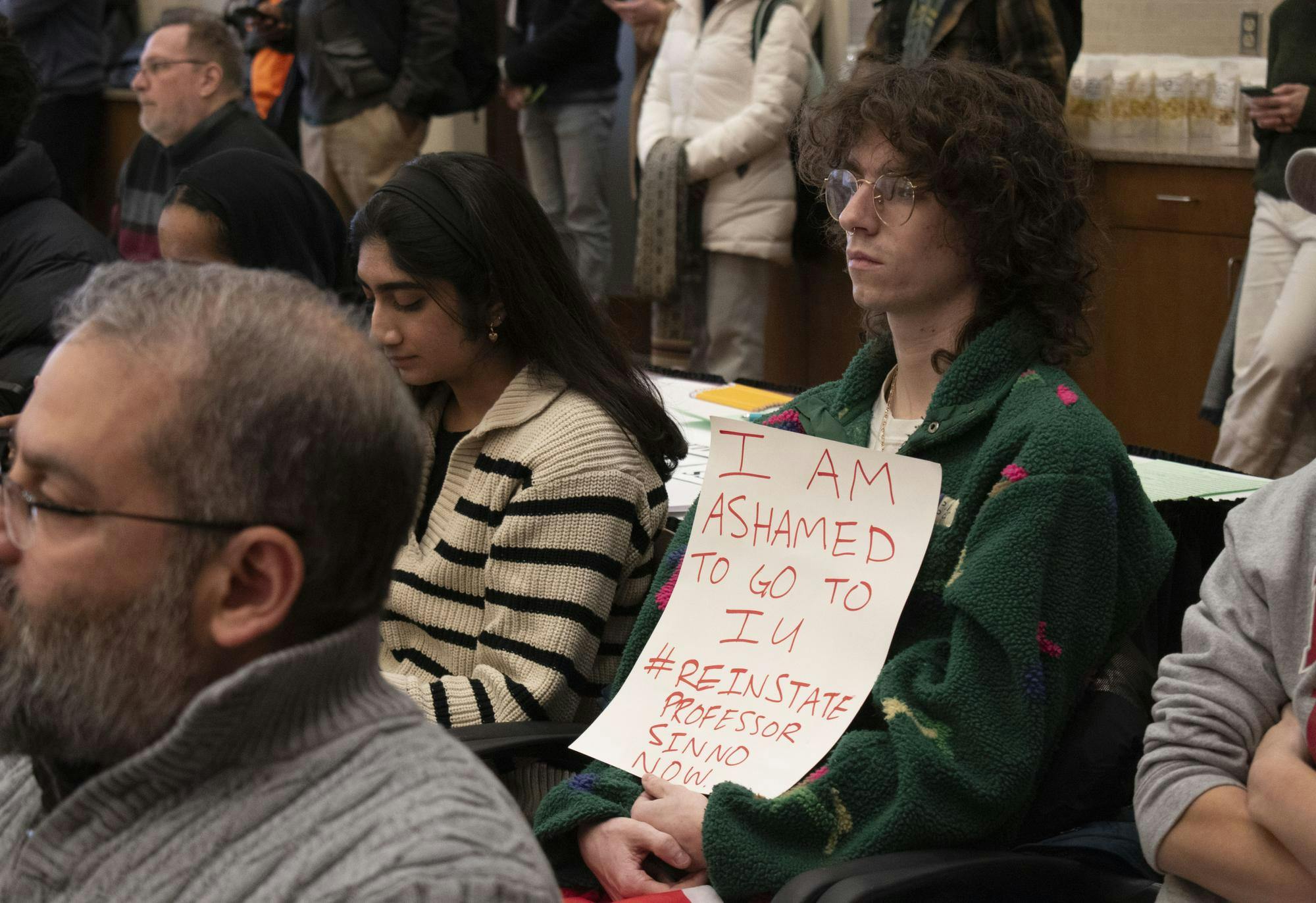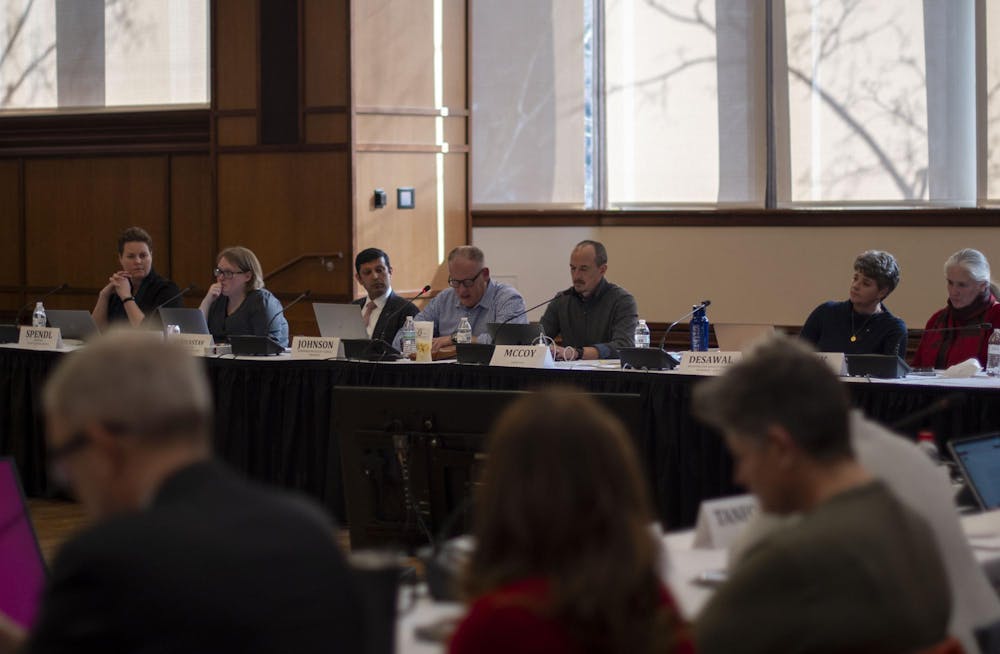IU Provost Rahul Shrivastav addressed recent backlash over the decision to suspend political science professor Abdulkader Sinno and cancel Palestinian artist Samia Halaby’s exhibition at a Bloomington Faculty Council meeting Tuesday. Both BFC members and student protesters expressed dissatisfaction with his answers during the meeting.
On Dec. 15, IU suspended Sinno from teaching until the upcoming fall semester for violating university policy when he filled out a room reservation form for an event with Israeli American speaker and pro-Palestinian activist Miko Peled. Sinno reserved the room on behalf of the Palestine Solidarity Committee, which he was a faculty advisor before his suspension. Carrie Docherty, vice provost for faculty and academic affairs, said he violated university policy by filling out the form incorrectly.
Less than a week later, IU cancelled Halaby’s abstract art show at the Eskenazi Museum of Art despite three years of planning. Madison Gordon, who works at Halaby’s studio, said the university informed Halaby the event was cancelled due to her pro-Palestinian social media posts and security risks.
Shrivastav’s address to the BFC
In his address Tuesday, Shrivastav affirmed IU’s commitment to Palestinian, Arab and Muslim community members, academic freedom, artistic expression and shared governance. He said some decisions may be the best of two undesirable options but reiterated these administrative decisions were made in IU’s best interest.
Shrivastav added that providing transparency can be difficult in some situations due to practical, legal or reputational concerns, which can lead the public to rush to judgement due to a lack of information.
Headlines and social media posts concerning IU in recent weeks, Shrivastav said, are not reflective of IU. He stressed the complexity of the current environment regarding the Israel-Hamas war, which he said has made universities a “flashpoint,” complicating decisions due to safety concerns.
A major theme of Shrivastav’s address was an emphasis on safety, which he said has become especially important with emotions heightened by the Israel-Hamas war.
Shrivastav mentioned the vigils and rallies that were held at IU shortly after Hamas launched a deadly attack on Israel on Oct. 7 as an example, saying they “nearly ended in violence.”
While both the pro-Israel and pro-Palestinian events held at IU on Oct. 9 were peaceful, protesters from both sides clashed at Sample Gates near the end of the night, with some individuals shouting across a line of police officers.
Though he recognized Halaby’s alumna status and international acclaim, he described the exhibit as a “potential lightning rod” in a charged environment that could possibly invite protests. If IU were to allow Halaby’s exhibition to proceed, it would have been on campus for three months, requiring long-term security, Shrivastav said.
While Shrivastav said he could not comment on personnel matters, he said IU’s policies on events are content-neutral. He said some have been speculating that IU’s actions are coming from external pressures, but while IU has responded to concerns from legislative leaders, Shrivastav said all decisions have been made independently.
Though not explicitly mentioned in the address, U.S. Rep. Jim Banks of Indiana sent a letter to IU on Nov. 15 asking for information regarding antisemitism on campus and any instances of illegal activity following the Palestine Solidarity Committee protests on campus. In the letter, Banks warned IU could lose federal funding if the university condoned antisemitism.
Shrivastav said the decision to suspend Sinno without referring the matter to the Faculty Misconduct Review Board, which is detailed in a provision of university policy and elaborated on in a Bloomington campus policy, was based on the administration’s interpretation of policy and precedent.
However, if a faculty review board determines policy has not been followed, Shrivastav said he would implement referring matters to the FMRB if they recommended it.
“I’m committing here today that I will act on their recommendation as appropriate,” he said.
At the BFC meeting Tuesday, Carrie Docherty, vice provost for faculty and academic affairs, summarized data she had found on faculty discipline. Of the 49 cases referred to the vice provost’s office in the last five years, nine cases involved reassignment of teaching activities or limiting interaction with students. Only two of those nine cases were referred to the FMRB, she said.
Docherty said her decisions have been applied consistently in cases where she’s been involved
Faculty question provost, students protest
Throughout the speech, some faculty shook their heads in disagreement.
Students sat in the audience and lined the walls of Presidents Hall to watch Shrivastav’s address; one held a Palestinian flag while another displayed a sign that read “I am ashamed to go to IU #Reinstate Prof. Sinno now.”

During a short period for questions, BFC member Jonathan Michaelsen questioned whether there was a credible threat of violence made due to Halaby’s planned exhibition.
“It is a chilling effect on artists to say ‘your work is controversial — we aren’t gonna do it,’” he said. “Pure and simple.”
As the crowd applauded, Shrivastav thanked him for his question and said each issue requires a risk-reward assessment, with some issues carrying more risks than reward. He said the decision was not taken lightly.
Another BFC member expressed concern for decisions being made due to safety concerns without listing specifics. The provost said information could not be shared due to “various reasons.”
“I will tell you from my perspective if I have to make a decision on keeping a project, a program going when there is a risk of violence or a risk of other incidents, I would err on the side of caution,” Shrivastav said.
Another BFC member asked if the decision would have been different if Halaby was an IU professor. Shrivastav said yes, because then the decision would involve academic freedom. The answer prompted laughter from the crowd.
Finally, a BFC member asked if IU would consider an advisory board on anti-Palestinian sentiment. Shrivastav said it was a possibility in the future and listed things IU has done to support Palestinian, Arab and Muslim students, such as adding the definition of Islamophobia to IU’s Diversity, Equity and Inclusion website. Shrivastav also said IU has been working on developing a Muslim Cultural Center for over a year.




